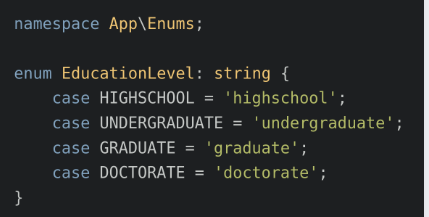Learn more about ENUM validation in Laravel. Our Laravel Support team is here to help you with your questions and concerns.
All About Laravel Validation ENUM
Validation is a key part of web application development. It makes sure that user input meets predefined criteria. Laravel offers various validation rules, and one powerful approach includes using ENUM values.
Today, we are going to take a look at how to use ENUM-based validation rules in Laravel.
What is ENUM-Based Validation?
ENUM-based validation in Laravel relies on the `Illuminate\Validation\Rules\Enum` class to validate input data against a predefined set of options. This method provides a clear and structured way to define valid options using an ENUM class.

Here is a breakdown of the code:
- Import ENUM Class:
Here, we import the ENUM class for the specific field (`education_level` in this case). The ENUM class, such as `EducationLevel`, contains a list of valid options.
- Create ENUM Instance:
This generates a new instance of the Enum validation rule, passing the ENUM class (`EducationLevel::class`) as a parameter. This tells Laravel to validate the input against the options defined in the ENUM class.
- Validation Process:
This passes the Enum validation rule to the `validate()` method, which performs the actual validation on the input data.
Defining the ENUM Class
The ENUM class, in this example, is `EducationLevel` in the `app/Enums/EducationLevel.php` file.

Here are some key points about the ENUM class:
- Namespace:
Follow the convention of organizing ENUM classes in the `App\Enums` namespace.
- ENUM Declaration:
Use the `enum` keyword to declare the ENUM class. In this example, we specify that the ENUM values should be treated as strings.
- Defined Cases:
Enumerate the valid options using `case`.
Benefits of ENUM-Based Validation
- ENUM values offer a clear way to define valid options, minimizing the chances of errors.
- Centralizing valid options in an ENUM class makes it easy to manage and update them.
- The use of ENUM values improves the readability of our validation rules.
- ENUM-based validation ensures consistency in handling predefined options across the application.
Validation of ENUM Database Columns
In addition to input validation, Laravel also supports ENUM types in the database. For example, we can create an ENUM column in a migration as follows:
To validate input fields associated with ENUM database columns, the `in:foo,bar,…` rule can be applied:

Alternatively, we can use the `Rule` class for a more dynamic approach:

In conclusion, ENUM-based validation in Laravel lets developers create more robust, maintainable, and readable code.
[Need assistance with a different issue? Our team is available 24/7.]
Conclusion
Today, our Support Engineers introduced us to ENUM based validation in Laravel.
PREVENT YOUR SERVER FROM CRASHING!
Never again lose customers to poor server speed! Let us help you.
Our server experts will monitor & maintain your server 24/7 so that it remains lightning fast and secure.







0 Comments